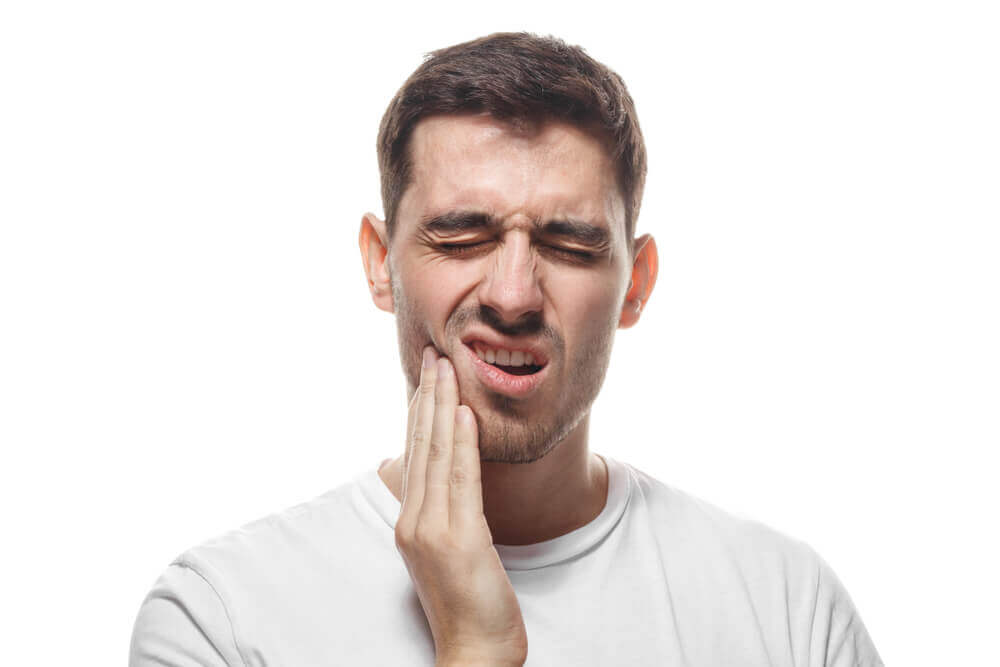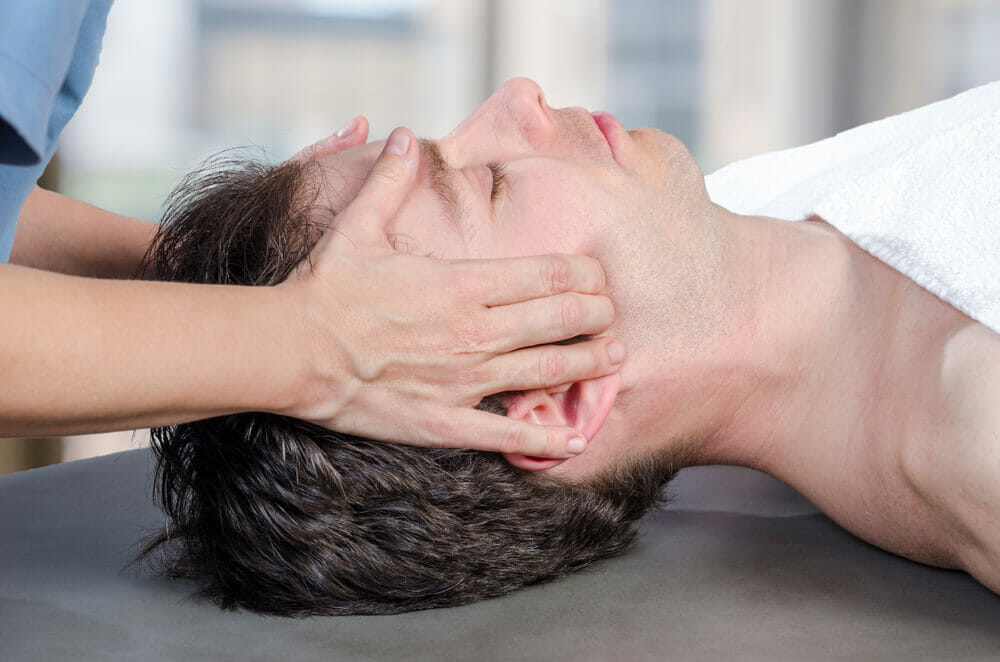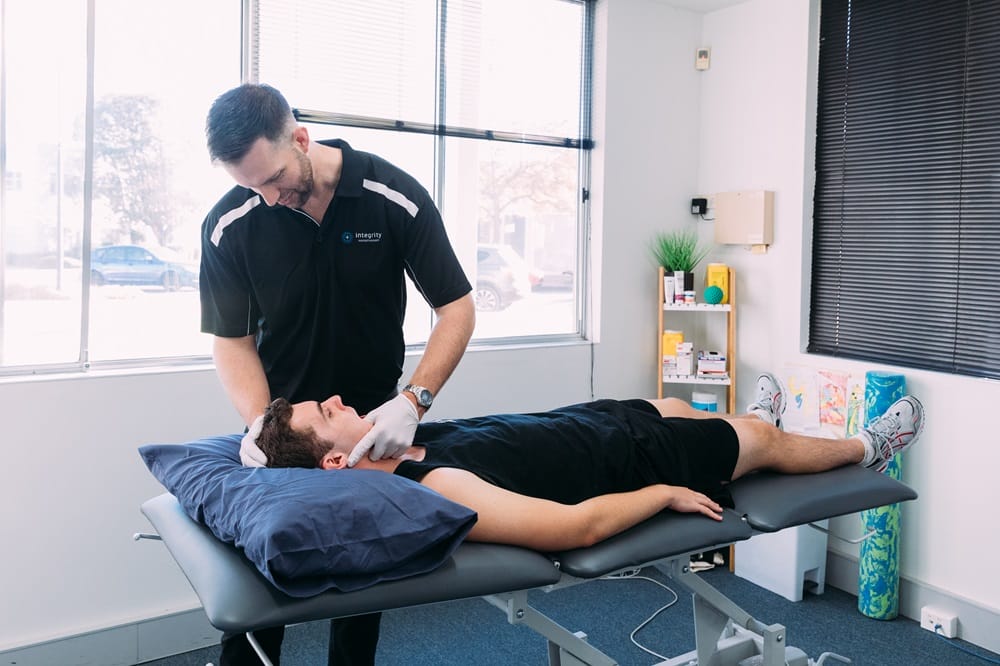
We use our jaw for talking, eating, and breathing, so making sure it’s in tip-top condition is important. Jaw pain can affect your life day to day, restricting your ability to eat or speak.
1. Jaw Pain Causes
Commonly, jaw pain is a result of an abnormality or injury to the joint or muscles of your jaw, but finding out what exactly is affecting your own jaw can be confusing.
Some common causes of jaw pain include:
Temporomandibular Joint Pain (TMJ)
This hard-to-pronounce joint is a double hinge connecting each side of the jaw to the skull. TMJ disorders are a common cause of jaw pain but they require an experienced practitioner to diagnose and treat as they are often a result of multiple different causes. Some of the causes of TMJ disorders include:
- Injury or trauma to the jaw joint
- A displaced disc that would usually help to cushion the movements of the jaw, or arthritis of this disc
- Excess stimulation of the jaw joint—including grinding your teeth or involuntary clenching of the jaw due to stress and anxiety
- Pain from the muscles that control jaw movement

Broken Or Dislocated Jawbone
Suffering a trauma to the jaw joint—such as getting hit in the face while playing sports—can result in a broken or dislocated jawbone, causing your pain.
Toothache
In some cases, severe tooth infections or other dental problems can cause referred pain that radiates to the jaw. Confusingly for the patient, some types of jaw pain can also refer to the teeth.
Sinus Problems
Sinuses are air-filled cavities located close to the jaw joint. If these become infected with a virus or bacterium, the result can be an excess build-up of mucus that may put pressure on the jaw joint, causing your pain. Again, on the flip side, pain that feels like sinus can also come from your jaw.
Psoriatic Arthritis
Jaw pain could also be the result of a joint disease called psoriatic arthritis (PsA). PsA is an autoimmune disease that attacks healthy joints, causing inflammation, swelling, and jaw pain. Symptoms can be severe enough to disrupt sleep, chewing, speaking, and eating. Studies also show that PsA can result in gum decay and tooth damage.
Relief From Jaw Pain
The causes of jaw pain and the required treatments for jaw pain are a specialty area, requiring a clinician with experience to treat. However, there are effective at-home treatments for immediate pain relief.
Apply Heat Or Ice Packs
Some types of jaw pain will respond to ice particularly if the pain is acute (short term). Try applying wrapped ice to your face for 10 minutes, take it off for 10 minutes and then reapply. The cold constricts blood vessels and decreases circulation to the area, which will reduce the swelling and discomfort that jaw pain causes. Keep the cold away from your eye.
When applying heat, the best option is a wheat bag from the microwave. Heat the pack to a moderate temperature only to reduce the risk of a burn and keep it away from your eye. This heat can relax overactive jaw muscles and help to relieve pain.
Whether you are using ice or heat, consider covering it with a cloth when applying it as it could burn your skin. If it feels too hot or too cold, remove it from the area.
Massage
Using your index and middle fingers, rub the sore area of your jaw in a circular motion for 5-10 rotations, then repeat this with your mouth open. You could also try massaging the muscles on the side of your neck to help relieve tension.
Always start slowly and gently, it may feel sensitive initially but if you are experiencing pain, stop and seek other treatment from your physiotherapist.

Over-The-Counter Pain Relief
Medicines including ibuprofen and paracetamol may help to temporarily reduce discomfort.
Stress Reduction
Practising mindfulness is a good way to reduce a range of painful conditions including jaw pain. Trying meditation techniques or practising yoga is a great way to clear your mind from focussing on your pain and to also help relax your jaw.
Avoid Chewy Foods
Trying to maintain the resting position of your jaw as much as possible will help reduce your pain.
Avoid overworking your painful jaw with foods such as:
- Apples
- Beef jerky
- Toffee or sweets
- Chewing gum
Avoid Caffeine
Caffeine can contribute to muscle tension, so avoiding large amounts of it may help to reduce your jaw pain over time.
Medical Treatments
If your jaw pain causes at-home treatments to become ineffective, seeking advice from your doctor is another option. They can prescribe a number of medical interventions as part of your treatment plan.
Mouth Guard Or Oral Splint
A custom-fitted, plastic dental protector—or mouthguard—may be needed to help you to stop unconsciously grinding your teeth, aggravating your jaw pain. Similarly, an oral splint may be prescribed by your health care professional to help prevent jaw clenching.
Physiotherapy For Jaw Pain
A treatment plan of manual therapy and exercises to release tension and strengthen the jaw muscles can be created with a jaw physio in Perth to help manage your pain and improve your condition. There are a range of treatment techniques available that can be effective for jaw pain.

Muscle Relaxants
Jaw pain causes muscles to tense, so this type of medication can help relieve the pain caused by muscle spasms in your jaw and are usually used for a few days or weeks.
Always consult your doctor before use of this medication for your jaw pain.
Botox Injections
A more invasive treatment for jaw pain is Botox injections. The botulinum toxin found in Botox may keep your jaw from clenching maximally and may reduce the pain caused by muscle tension. These injections last for a few months, after which re-injection may be necessary.
Jaw Surgery
In very rare instances, surgery may be recommended to correct the cause of your jaw pain. This is usually done when all other options have been exhausted and there is still severe pain, or there are structural problems in the jaw joint.
How We Can Help
At Integrity Physio Como, we offer Perth physiotherapy to treat a range of conditions including jaw pain. Get in contact with our friendly team today to see how we can help you with your chronic pain.




